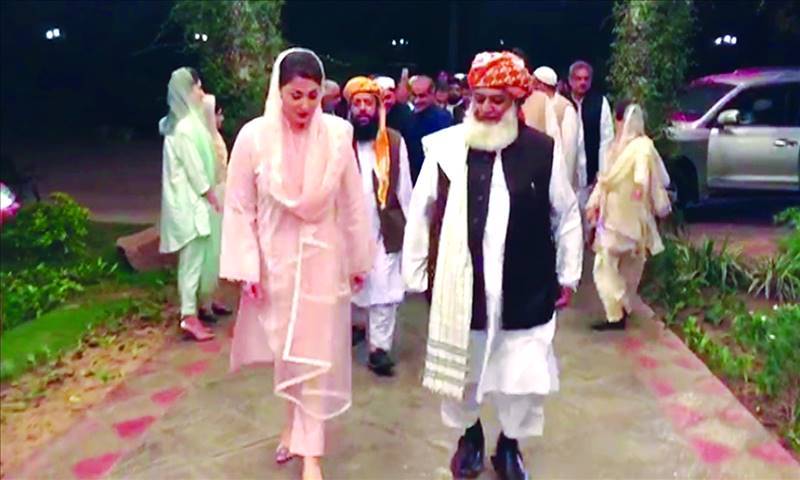
As political temperatures in the country rise, the creeping coup advances and space for dissent and political discourse continues to shrink. A number of developments since PML-N supremo Nawaz Sharif gave an hour-long speech at the APC convened by PPP Chairman Bilawal, which was followed by the formation of Pakistan Democratic Movement (PDM), will illustrate this.
In an interview, Prime Minister Imran Khan accused Nawaz Sharif of “maligning the army at India’s behest” and warned of arrests of all opposition leaders. In a flush of bravado, he ridiculed Nawaz’s claim that the ISI chief had asked him to resign during the PTI’s sit-in. Imran said if an ISI chief had said the same to him, he would have sacked him. Imran said went on to add that, “I would have sacked the army chief if the Kargil operation was conducted without informing me.” Imran may be excused for such bravado.
The day when Imran threatened the opposition with mass arrests, Islamabad High Court Chief Justice Athar Minallah addressed the International Institute for Justice Excellence and spoke of enormous pressures judges in Pakistan faced.
Almost simultaneously, PEMRA - the regulatory authority for electronic media - banned the broadcast of speeches, interviews and public addresses of “absconders and proclaimed offenders” on the complaint of a private citizen. The order came within hours of Nawaz Sharif’s second address to his party’s central working committee meeting.
Then, sedition charges were slammed against dozens of political leaders and lawmakers for instigating rebellion against the state. The case was instituted on a complaint by a private person, who later turned out to be a PTI office bearer.
Federal ministers promptly distanced the government and PM Imran Khan from the move, claiming that the prime minister did not approve of it. Sedition under Section 124-A of Pakistan Penal Code relates to rebellion against the government. No one explained who was behind the FIR, if the government was denying any role. It is hard to imagine a police official doing such a thing on his own, unless he was directed from above.
It is worthwhile recalling a similar incident early last year, when Manzoor Pashteen and other PTM activists came for a visit to Karachi. The bureaucracy issued an order behind the back of the chief minister, banishing the visitors from the province. Both Chairman Bilawal Bhutto Zardari and the chief minister took serious notice of the incident and investigations were held. The unauthorised expulsion notification was later withdrawn.
As temperatures rise, the Islamabad High Court issued a proclamation against Nawaz Sharif, directing him to surrender within 30 days. It also ordered the proclamation be published in two leading newspapers. In case the former PM still remains absent, he would be declared a proclaimed offender and his properties seized.
Just when the IHC order was issued, the head of newly formed PDM was meeting Maryam Nawaz in Jati Umara, Raiwind, where plans for PMD’s first demonstration in Gujranwala next Friday were discussed. “Imran Khan kay paseenay chootay huway hain,” (Imran Khan is sweating) an upbeat Maulana Fazlur Rehman declared.
In the midst of all this, space for free speech is fast shrinking as the government leans on regulatory bodies to stifle dissent and criticism in the name of security and maligning state institutions
Two days ago, the Ministry of IT quietly submitted to the cabinet a set of new regulatory rules to remove or block access to select online content. Titled Removal and Blocking of Unlawful Content (Procedure, Oversight and Safeguards) Rules, 2020, these rules are a replica of the earlier draft of the Citizen Protection (Against Online Harms) Rules, 2020 that were held in abeyance, following massive protests by multiple stakeholders.

When the earlier draft rules were suspended, it was given out that new rules will be framed in consultation with local and global stakeholders. The new rules, however, have not been made public, let alone drafting them in consultation with the stakeholders. The secrecy around the new rules has only confirmed the fears that the so-called consultation was a ruse and that the powers that be wanted to stifle free speech and clamp down on social media.
Reportedly the new rules empower PTA to remove and block access to online content in name of “against the interest of Islam, integrity, security and defence of Pakistan, public order, decency and morality” besides the content that constitutes an offence under various sections of Pakistan Penal Code (PPC) or the Code of Criminal Procedure.
As reports of the new rules poured in, the Asia Internet Coalition, a body of fourteen technology companies including Google, Twitter, Facebook and Amazon addressed a letter to the prime minister last Wednesday, expressing deep concern over the lack of transparency in the making of new rules. “The rules, if improperly formulated, would actively harm the business environment in Pakistan and its attractiveness as an investment destination for technology companies,” the letter said.
An army major general has already been positioned as head of the watchdog PTA. Previously serving as DG of the military-run telecommunication outfit which provides services in Azad Kashmir and Gilgit-Baltistan, he was appointed as PTA chief in January last year, recalling him from retirement some months before.
It is also noteworthy that the licensing terms for satellite transmissions have also been changed, requiring such transmissions to be relayed only through Pakset which is controlled by a military-run outfit SUPARCO. Some keen observers have noted that during the Faizabad dharna, television transmissions at times appeared to have been remotely controlled, a scenario that is possible only if transmissions are routed through a locally operated and controlled satellite.
As political temperatures rise and creeping coup advances, the first casualty is the freedom of expression.
The writer is a former senator
In an interview, Prime Minister Imran Khan accused Nawaz Sharif of “maligning the army at India’s behest” and warned of arrests of all opposition leaders. In a flush of bravado, he ridiculed Nawaz’s claim that the ISI chief had asked him to resign during the PTI’s sit-in. Imran said if an ISI chief had said the same to him, he would have sacked him. Imran said went on to add that, “I would have sacked the army chief if the Kargil operation was conducted without informing me.” Imran may be excused for such bravado.
The day when Imran threatened the opposition with mass arrests, Islamabad High Court Chief Justice Athar Minallah addressed the International Institute for Justice Excellence and spoke of enormous pressures judges in Pakistan faced.
Almost simultaneously, PEMRA - the regulatory authority for electronic media - banned the broadcast of speeches, interviews and public addresses of “absconders and proclaimed offenders” on the complaint of a private citizen. The order came within hours of Nawaz Sharif’s second address to his party’s central working committee meeting.
Then, sedition charges were slammed against dozens of political leaders and lawmakers for instigating rebellion against the state. The case was instituted on a complaint by a private person, who later turned out to be a PTI office bearer.
Federal ministers promptly distanced the government and PM Imran Khan from the move, claiming that the prime minister did not approve of it. Sedition under Section 124-A of Pakistan Penal Code relates to rebellion against the government. No one explained who was behind the FIR, if the government was denying any role. It is hard to imagine a police official doing such a thing on his own, unless he was directed from above.
Licensing terms for satellite transmissions have also been changed, requiring such transmissions to be relayed only through Pakset which is controlled by a military-run outfit
It is worthwhile recalling a similar incident early last year, when Manzoor Pashteen and other PTM activists came for a visit to Karachi. The bureaucracy issued an order behind the back of the chief minister, banishing the visitors from the province. Both Chairman Bilawal Bhutto Zardari and the chief minister took serious notice of the incident and investigations were held. The unauthorised expulsion notification was later withdrawn.
As temperatures rise, the Islamabad High Court issued a proclamation against Nawaz Sharif, directing him to surrender within 30 days. It also ordered the proclamation be published in two leading newspapers. In case the former PM still remains absent, he would be declared a proclaimed offender and his properties seized.
Just when the IHC order was issued, the head of newly formed PDM was meeting Maryam Nawaz in Jati Umara, Raiwind, where plans for PMD’s first demonstration in Gujranwala next Friday were discussed. “Imran Khan kay paseenay chootay huway hain,” (Imran Khan is sweating) an upbeat Maulana Fazlur Rehman declared.
In the midst of all this, space for free speech is fast shrinking as the government leans on regulatory bodies to stifle dissent and criticism in the name of security and maligning state institutions
Two days ago, the Ministry of IT quietly submitted to the cabinet a set of new regulatory rules to remove or block access to select online content. Titled Removal and Blocking of Unlawful Content (Procedure, Oversight and Safeguards) Rules, 2020, these rules are a replica of the earlier draft of the Citizen Protection (Against Online Harms) Rules, 2020 that were held in abeyance, following massive protests by multiple stakeholders.

When the earlier draft rules were suspended, it was given out that new rules will be framed in consultation with local and global stakeholders. The new rules, however, have not been made public, let alone drafting them in consultation with the stakeholders. The secrecy around the new rules has only confirmed the fears that the so-called consultation was a ruse and that the powers that be wanted to stifle free speech and clamp down on social media.
Reportedly the new rules empower PTA to remove and block access to online content in name of “against the interest of Islam, integrity, security and defence of Pakistan, public order, decency and morality” besides the content that constitutes an offence under various sections of Pakistan Penal Code (PPC) or the Code of Criminal Procedure.
As reports of the new rules poured in, the Asia Internet Coalition, a body of fourteen technology companies including Google, Twitter, Facebook and Amazon addressed a letter to the prime minister last Wednesday, expressing deep concern over the lack of transparency in the making of new rules. “The rules, if improperly formulated, would actively harm the business environment in Pakistan and its attractiveness as an investment destination for technology companies,” the letter said.
An army major general has already been positioned as head of the watchdog PTA. Previously serving as DG of the military-run telecommunication outfit which provides services in Azad Kashmir and Gilgit-Baltistan, he was appointed as PTA chief in January last year, recalling him from retirement some months before.
It is also noteworthy that the licensing terms for satellite transmissions have also been changed, requiring such transmissions to be relayed only through Pakset which is controlled by a military-run outfit SUPARCO. Some keen observers have noted that during the Faizabad dharna, television transmissions at times appeared to have been remotely controlled, a scenario that is possible only if transmissions are routed through a locally operated and controlled satellite.
As political temperatures rise and creeping coup advances, the first casualty is the freedom of expression.
The writer is a former senator

